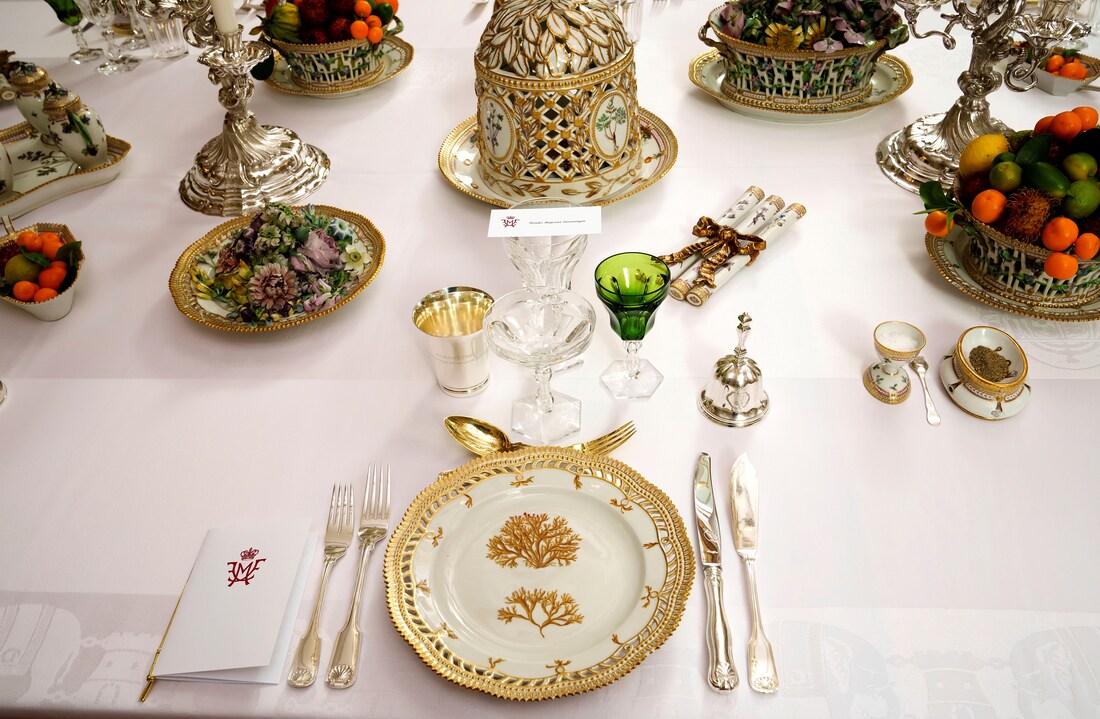|
Course Overview:
Join us for a unique opportunity to enhance your etiquette knowledge and have your questions answered. Author, teacher and etiquette historian, Maura J. Graber will be joining Elizabeth Soós of Auersmont Etiquette for an online seminar in which they plan to enlighten, educate and entertain with the true reasons our dining etiquette rules exist, the history of the rules and the backstories behind them. Course Contents: This 2 hour course is designed for individuals of all backgrounds and professions, especially those in the field of etiquette! Attendees to this online seminar will discover how increasing one’s knowledge of etiquette can assist in making one more prosperous in business and social endeavours. We live in a world of many “Whys.” Why not join in the discussion? Questions Which Need Answers: Please submit any questions you have about dining etiquette, as the course will be tailored to address them. All questions must be submitted by April 15, 2025, via this link: Google Forms: https://forms.gle/DXbMfA3LFvsc... Here are two examples of questions:
Course Curriculum: Introduction 'Where Etiquette Meets History' Module 01: Understanding the Differences Between Etiquette & Manners Module 02: Popular Etiquette Myths and Troubling Trends Module 03: Understanding Table Ware Module 04: Navigation of a Multi Course Meal, the Place Setting & Utensils Conclusion: Concluding Remarks and Question Period with Participants We extend a formal invitation to participate in our online group course, designed to enhance your dining etiquette proficiency. This program offers a structured learning environment to cultivate essential dining skills in various dining settings > Join us today!
0 Comments
Through a dear friend, I was introduced to an extraordinary figure in Indian society, Dr. Ashok Gupta. From humble beginnings in a village in inner India, Dr. Gupta has risen to become a celebrated and decorated plastic surgeon. He selflessly volunteers his time and resources to help the underprivileged, including survivors of wars, terrorist attacks, major accidents, to those with birth defects, as well as Bollywood stars and Hindi TV serial personalities. His contributions have been recognised by numerous governments, Gulf royalty, and international film festivals. Dr. Ashok Gupta began his career at Government Medical College in Nagpur, moved on to Grant Medical College in Mumbai, and then advanced his training in the United Kingdom at The Royal College of Surgeons, in Scotland. I wanted to interview this prestigious plastic surgeon to gain insights from his 50 years of service, learn about his views on business etiquette and protocols, and gather tips he could offer to aspiring professionals. Governmental and Royal Protocol Before becoming the recipient of “Sheikh Hamdan International Award” in 2010, or meeting Gulf royalty in completely different circumstances, the royal protocol officer was asked to provide invaluable information in how one should conduct oneself. According to Dr. Gupta, when meeting Gulf royalty, one should “reflect respect for their culture, traditions, and customs.” One should also show appreciation for an “occasion's significance and highlight one's understanding of royal etiquette.” I would have to agree. Understanding and adhering to royal protocols not only demonstrates respect but also highlights one’s maturity and cultural sensitivity. Here are some points of protocol training that Dr Gupta learned and passed on to me in our talk: Clothing and Grooming
Cultural Etiquette
Addressing The Royal Family Depending on which King, Shaikh, Amir, Sultan or Crown Prince you may meet or write to, always seek the direction of the royal protocol office. There you will receive the correct way to address and correspond with the Royal Family. For instance, you may receive information such as the following when verbally addressing a Crown Prince from Saudia Arabia, Jordon or Morocco:
The takeaway here is undeniable: Dr. Gupta’s adherence to these protocols and his reflections on their importance, serve as a guide for anyone seeking to engage respectfully and appropriately with any royalty. His experience underscores the value of cultural etiquette in building respectful and meaningful connections across different societies, which he still maintains today. Succeeding in a Business Environment He recalled an experience during his time at the surgeon's college when a lecturer observed him carefully cleaning a wound, suturing it precisely, and neatly dressing it. The lecturer told him he had an aptitude as a surgeon and encouraged him to continue. Dr. Gupta used this feedback as a building block for how he would provide care to all his patients. This approach is two-fold: first, when performing work, he ensures it is done well and with patience; second, he recognises that the patient has entrusted him with their care in which he is thankful for their trust. The takeaway here is important: Whether working for yourself or someone else, approach your work with zeal, passion, and a commitment to excellence. Strive to give over 100% to your clients or customers, as their satisfaction and trust will be your most valuable endorsements—more impactful than any review on Google or Trustpilot. Here are Dr. Gupta's three key guidelines for succeeding in a business environment:
Dressing Professionally While speaking with Dr. Gupta, I noticed on two occasions that he was dressed professionally. During the interview, he wore doctor's scrubs with his name and practice embroidered in red. Why is this important? Trust and confidence. If you were looking for a plastic surgeon to perform life-altering work, would you trust someone wearing sneakers, a t-shirt, and jeans, or a surgeon in business attire or a medical uniform? I know which one I would choose. This brings to mind Dr. Gupta’s account of a young surgeon who was to be interviewed by a doctorate board in Mumbai. The young surgeon arrived in casual attire and was not allowed to enter the interview room because his choice of attire was deemed incorrect and unprofessional. He was subsequently told to reapply at a later date. Dr. Gupta, who practiced in Bahrain for some time, shared an anecdote about one of his patients, an American woman. During their consultation, she remarked on the importance of a woman’s and man's presentation, specifically mentioning the condition of his shoes. What did she mean? She was emphasising the significance of the little details in a man's overall presentation. Both men and women notice non-verbal cues such as body language, dress, and grooming. Ensuring small details, like removing dust from shoes and keeping the back of the shoes clean, matters. Should we worry about the back of our shoes and clothing? The answer is, “Yes!” Here are Dr. Gupta's three important pointers in dressing professionally:
The takeaway here is clear: The way you present yourself, including professional attire and attention to small details, significantly impacts trust and confidence in your abilities. Whether in an interview or a consultation, demonstrating professionalism through your appearance is crucial for making a positive impression. Cross-Cultural Communication
Whilst speaking with and interviewing Dr. Gupta, I noticed several things about his demeanour. His delivery is caring, methodical, and purposeful. He is always ready to explain the answers to any questions you may have, without making you feel ignorant for asking, which inspired ease and made me feel instantly relaxed in his presence. And he smiled! However, this was not always the case. Let me explain. Fresh out of India and practicing in the United Kingdom under the guidance of his college, Dr. Gupta encountered a 15-16-year-old female patient seeking plastic surgery on her nose. One of the standard questions is, "What medication are you currently taking?" To his shock, she mentioned she was taking contraceptive pills. The observing lecturer took him aside and stated kindly yet firmly that he needed to understand the cultural system of the country. This became the foundation for his doctor-patient behaviour, emphasising the importance of building effective communication strategies and learning about cultural etiquette. The takeaway here is paramount and two-fold: Effective communication and cultural awareness are essential for building trust and confidence in any doctor-patient relationship. Dr. Gupta’s experience highlights the importance of understanding cultural contexts and honing interpersonal skills to provide compassionate and competent care. Here are Dr. Gupta's four important pointers in cultural communication:
Giving Back to the Community After researching Dr. Ashok Gupta's website (https://drashokgupta.in/), I was impressed by his pro bono surgeries for war victims, Mumbai shooting survivors, acid attack victims, accident victims in remote areas, and more. During the interview, I asked him why he dedicated time to these cases when he could focus on building a thriving practice. Dr. Gupta simply explained his motivation: "It's about giving back, generating goodwill, and expressing gratitude for the opportunity to use my skills." Here are some powerful examples of his impact: A child found in the Varanasi jungle with a severe animal bite, received surgeries from Dr. Gupta at ages 5, 10, 15, showcasing the long-term care provided. A truck accident victim, who required 40 hours of surgery, received his care with Dr. Gupta leading a team of 7 doctors. Dr. Gupta described losing track of time due to his intense focus, but the surgery's success allowed the man to marry and start a family. These stories exemplify the profound impact Dr. Gupta's work has on people's lives. What can we learn from this? Natures law on equal returns: Dr. Gupta's story highlights the power of pro bono work that professionals can leverage their skills to significantly improve lives and communities. Giving back generates personal fulfillment and strengthens the social fabric, as seen by Dr. Gupta's dedication and the positive outcomes for his patients. I hope that you enjoyed reading this, as much I enjoyed interviewing Dr Ashok Gupta. It was a privilege to meet such a talented individual who is not only passionate about his field but also dedicated to sharing his knowledge with aspiring professionals and recent graduates. His vast experience is truly remarkable! Published In: Etiquipedia.blogspot.com I have been in India for nearly a year, living in Mumbai. I travel regularly on the local trains about once or twice a month and on the metro train almost daily. One of the most remarkable sounds is the noise of a carriage packed with people after a long day of work, with everyone on their phones, mostly talking. It's hard to find words that truly capture the clacking of the train against the hum and volume of the Hindi conversations filling the air. When I first arrived, I was completely in awe. It seemed like every Indian I saw was doing something on their phone, at a noise level I had never heard publicly before. While Western societies, and most others the world over, have chosen to go down one path, Mumbai, and the rest of India from what I hear, have boldly gone down the other path. While etiquette professionals like myself expose the benefits of good mobile manner, who promote and embrace the motto, “silence is golden” when it comes to mobile use, all of India has proudly ventured forth and lived out loud online, without a thought to lowering the volume. The unusual etiquette caught this world traveling Australian by surprise. India is a very welcoming and hospitable country in nearly every respect. Their lives are often hectic and harried. Their mobile phone use while they commute is especially fascinating. They relish this “commute time” with their mobile phone’s internet access, even though they are packed like sardines in rail cars. YouTube is their site of choice when not texting or loudly chatting with friends and family on the phones. But wait, it’s not just on the trains. I’ve witnessed families who live on the streets, all gathered around, video-calling family on their phones, with a saucepan as a makeshift prop, all sitting on the ground. Or, a motorcyclist will often be seen with a phone tucked between his helmet and face speaking, making his mobile use ‘hands-free’ in order to focus on driving. But as committed as he is to his phone, I don’t feel that much safer. There’s almost never a moment when someone isn’t talking, texting, scrolling, or watching something on YouTube, Facebook, or WhatsApp. Mobile or cell phone manners in India are a complete reverse of what is acceptable in Western, and even most other Asian nations. There is no such thing as “phubbing” in India. By the way, if you're unfamiliar with the term "phubbing," Wikipedia defines it as 'the habit of snubbing a physically present person in favor of a mobile phone.' This got me thinking about the reasons behind this reverse of social acceptance of continually being connected with their mobile phones. Reflecting on Australian culture, we often talk when we’re in the mood to chat or have something important to say. I may have even have something I really need to ‘get off my chest.’ It’s a worldwide phenomenon just how much time one spends on their phones, compared to how Western societies lived just 30 years ago. Texting and DM’ing has certainly become our main communication mode, however. We usually keep our thoughts and opinions in written form, as opposed to speaking loudly on our phones in public. We notice it when someone breaks the expected etiquette around us. We prefer others to turn away or we will turn our backs in order to briefly chat on the phone in hushed tones. We will leave a room or even go outside, if we need to make or take a call. It has become the norm, nearly 40 years after Japanese mobile phone manufacturers added a “silence” button to their phones, literally setting the standard for other nations to follow. If someone is publicly venting his or frustrations or joking with friends in anything but a muffled or quieted voice, we get glares from those around us, along with the occasional a choice comment of the unwelcome kind. If we do make phone calls, they generally aren’t group activities like those I witness daily now, or overhear daily now, in Mumbai. They are usually solo calls. And we show a reverence and respect for those whose ears are around us. To better understand South Asian culture, I started listening more intently, and my ears became like the Arecibo reflective dish. I believe the following are the factors that have created this open dialogue on cell phones throughout India to such a volume: The South Asian Culture – This is known for its open and expressive nature. This is evident in the ease with which strangers can converse on the street, in public transport, or anywhere else. I've often witnessed people engaging in friendly chats simply to ask for directions, highlighting the culture's openness and approachability.
The South Asian Family Structure - The family plays a central role in the lives of most South Asians, often characterized by collectivism, patriarchy, and hierarchy. Loyalty and interdependence are highly valued, and younger members are often expected to conform to family decisions, including those related to education, marriage, or career. The concept of “saving face” is central to family dynamics, emphasizing the preservation of a positive reputation within the community. This collectivist mindset, combined with the power dynamics within families, can often extend to business environments. Managers and owners may adopt a similar approach, micro-managing staff and dictating their tasks, methods, and timelines. No Work-Life Balance – Work-life balance is a challenge in India. While the Western world is implementing four-day workweeks and mental health days, Indian businesses often require employees to work six days a week and be on-call, even after long hours. I've personally witnessed friends being called by colleagues or bosses after returning home from work. For many, the train journey home is a valuable time to connect with family and friends without needing in-person visits. A Curious Case of College Blues - I was astonished by the Indian public school education system, especially when considering non-private, government-funded schools. Let me elaborate. In Maharashtra, school hours typically run from 9a.m. to 2 p.m., but students often attend private tuition sessions. The school system itself doesn’t fully meet the educational needs of the students, so tutors step in to revise, review, and extend learning beyond school hours. You will see parents with their neatly uniformly dressed children, hand-in-hand, taking their child to-and-from tutors, until the evening, walking or in-cars talking on the mobile. They might be discussing plans or simply catching up on their mobile phones. Domestic Immigration - Mumbai and Delhi serve as major hubs for internal migration, drawing people from economically weaker states like Andhra Pradesh, Uttar Pradesh, Nepal, West Bengal, Tamil Nadu, and more. Many of these migrants live far from their families, relying heavily on phones to stay connected. But why the constant phone usage? From what I’ve gathered through conversations, these calls are about navigating life’s decisions. Whether it’s about personal choices, family matters, work, or friends, they’re all trying to make the best decisions while being away from home. Wherever you live in the world, be it Australia, Great Britain, Europe, Russia, or the Americas, it's indisputable that people all over have a strong affinity for their phones. In India, though, it is the group out activity nature of so many of the numerous mobile phone calls which is unique. This constant engagement can be attributed to the proliferation of social media platforms and mobile apps, which have provided countless opportunities for entertainment, education, and social interaction. The combination of technological advancements, affordability, cultural factors, and the allure of digital content has solidified phones as an indispensable part of Indian life. Published In: Etiquipedia.blogspot.com An Editorial Article about Mary Elizabeth, Her Majesty The Queen of Denmark, Countess of Monpezat.18/10/2024 Official portraits of The Royal Family Photo: Dennis Stenild, Kongehuset © Today I am highlighting someone that I consider a wonderful example and a champion of the Danish and Australian people, Mary Elizabeth, Mary Elizabeth, Her Majesty The Queen of Denmark, Countess of Monpezat. I am pleased to give you an editorial series that positively talks about Queen Mary and her achievements and the mark she has left for generations to come. Today, I will be spotlighting areas of Queen Mary and the Royal Danish Court:
Gala photos of The Crown Prince Family Dennis Stenild, Kongehuset © Queen Mary in Her Role as Her Majesty Why have I focused on Queen Mary today? Many I speak to admire Queen Mary. Who would have thought an Australian making their way into a notable Scandinavian royal family! Well, she did it on the premises of love. Let’s get to know the Queen Mary better. Queen Mary was born Hobart, Tasmania, Australia as Mary Elizabeth Donaldson. She is the youngest daughter parent to John Donaldson and Henrietta Donaldson; The Queen has two sisters and one brother. Where is Tasmania you may ask? It is a small island that makes up the seven states of Australia. Tasmania is known as the ‘island of contrasts’ where you can hike on rugged mountains, bathe in cleanest coastlines, picnic in the calmest bays, walk in native forests and the eat freshest produce you can find in Australia. The Crown Princess Early Years The Queen’s early years began in Texas. Returning to Hobart, Mary attended school the University of Tasmania graduating with a bachelor’s degree in Commerce and Law. Her further education continued, working for advertising agencies in Melbourne, Australia. Queen Mary was already well-travelled in her younger years and came from an emigree family that originated from Scotland. After achieving a university education and working in her areas of expertise, she travelled throughout Europe and the United Kingdom which included Scotland. Queen Mary worked in Scotland and for a short time in Paris, Melbourne and Sydney. HRH The Crown Princess's post on International Women's Day Photo Franne Voigt © Queen Mary Today Since her marriage The King Frederik of Denmark, Queen Mary has learnt to speak, fluently in Danish. Danish is not an easy language to learn however over time she has been able to be accomplished in this Nordic language. Her acceptance of the Danish culture can be seen in many family photos. You will see her dressed in national costume wearing traditional clothing from The Kingdom of Denmark and Greenland. The royal family resides with their family in Frederik VIII’s Palace at Amalienborg and in the Chancellery House at Fredensborg Palace. To assist Queen Mary to accomplish her many roles and look after the day-to-day palace many routines, available to her the secretariat, service unit and household staff. The staff assist her in making international visits, attend ceremonies, making visits to Danish forces around the world. The Queen - The Advocate Queen Mary is a passionate advocate for disadvantaged migrants, integration and fundraising projects, health and empowerment focusing on women, adolescent girls and children. You can find her to be the patron of The Alannah and Madeline Foundation, Twins Research Australia, Healthcare Denmark, University of Tasmania, European Emergency Medical Services Congress, Danish Cultural Institute. In 2007 Queen Mary announced the opening of the Mary Foundation which dedicates funds focusing on three areas such as bullying, well-being, domestic violence and loneliness. After marriage in 2004, throughout her years, Queen Mary has displayed an elegant, timeless and classic style and has featured in Vanity Fair’s annual best-dressed list, Vogue Australia, Germany, Woman Weekly Australia. She makes a point to wear Danish designers clothing and jewellery which has made famous brands such as Ole Lynggaard Jewellery, Copenhagen designer David Andersen. Official Photos Photo Dennis Stenild, Kongehuset © Quick Peek Into The History of the Danish Royal Family The Kingdom of Denmark was united by the 8th century under King Gudfred; however, from the 9th century onwards, it was reunited by the Viking king Gorm the Old and Harald Bluetooth as an elective monarchy. It then became hereditary from the 17th century onwards during the reign of Frederick III. Today the Danish Royal House is from a princely branch of the family Oldenborg and then Glücksburg. Christoffer III, in 1448, died, leaving no children and the Danish monarchy almost died out. Christian I was chosen from a branch of indirect family members. The reign of the Royal Family of Oldenborg lasted for over 415 years, reigning until 1863 when Frederik VII died childless. Once again, a descendant from the junior branch of the House of Oldenburg was given the role to reign Denmark, Prince Christian IX of Glücksborg. He reigned from 1863 to 1906, and he has concurrently held the titles of Duke of Schleswig, Holstein and Lauenburg. Christian's six children with Louise married into other European royal families, earning him the sobriquet "the father-in-law of Europe". His descendants' royal families were in Greece, Belgium, Norway, Luxembourg, the United Kingdom, Spain, Yugoslavia and Romania. Interestingly, The Act of Succession, 1953, permitted a female to reign, seeing Princess Margrethe become Queen in 1972. Modern Day Denmark Today Denmark has a constitutional institution. What does that mean? The monarch, HM The King, cannot independently perform political acts. The monarch must 'represent Denmark abroad and be a figurehead at home' and duties consisting of bestowing honours, appointing a prime minister, and family members attending ceremonial, diplomatic, and representational duties. The Kingdom includes Denmark and is not limited to Denmark itself; it includes autonomous territories of the Faroe Islands and Greenland. New Official Photos of The Crown Prince Family Photo Hasse Nielsen © Like most royals, using protocols and etiquette features heavily in the Queen's life, whether at home or in public. Many may think somehow that the individual is already an expert, or a wand is waved, and a magical transformation occurs. The truth is that training and just plain hard work is the secret formula to flawlessly stepping into a royal house that is over 1000 years old. How did Queen Mary do it? The Language Of Protocol Protocol is essential for any royal house. Protocol is the official procedure of systems that guides behaviour and human order. Protocols between kingdoms, countries, and people allow for smooth relationships and interactions. For example, if Queen Mary wanted to write to King Charles, and she knows him personally, there would be no need for her to write to the King's private secretary and address the letter to him. Conversely, let's say she didn't know the King personally and wanted to communicate with him directly. The protocol Queen Mary would use: the letter would begin with 'Sir' or 'May it please Your Majesty'. The first line would contain 'With my humble duty' and end the letter' I have the honour to remain, Sir, Your Majesty most humble and obedient servant'. Protocol would dictate that upon being presented to King Charles at Buckingham Palace for a state visit, Queen Mary would curtsy, a short and dignified dip keeping eye contact or bow from the neck (not waist). Conversely, if you are a Danish citizen, the Queen would stand and wait for you to bow or curtsey. If the royal hand is extended, take it lightly and quickly, at the same time performing a dip or bow. In Front Of The Camera You will see Queen Mary using natural and elegant hand movements and always looking straight at the person interviewing her. Using hand gestures creates a natural body movement which then affects your voice it shows that she is confident, comfortable and conversational. You will find many photos in the media of Queen Mary sitting at charities, presentations and royal visits, sitting visually perfect. Here is how she does it: when seated, the best deportment is sitting in the chair where you are not resting on the backrest. You are, in fact, a fist away and leaning 15 degrees forward, with a straight back. It's best not to have your back super straight, preferably relaxed and natural. If the chair has armrests, remember to keep your arms in and lay your hands on your lap. Using the armrest will hitch your shoulders up, making you look tense, and appear sloppy on camera. Foot placement is another consideration, affecting your posture and entire body deportment. Having the correct stance is best when talking in front of a camera. You can do this by placing one foot forward and the other back. All these techniques take practice, and the best approach is to use your camera to record yourself. The Elegance of Etiquette In all royal households worldwide, etiquette is a prominent feature that families follow. It is simply a code of polite behaviour. Royalty is the face and representative of their country; etiquette allows them to show kindness and mindfulness to people they meet. Etiquette covers many areas such as socialising, navigating a table setting, international customs, and business matters. Queen Mary has always been authentically ‘herself.’ She shows actual genuine care and respect for the people of the kingdom of Denmark and Australia. She has demonstrated flexibility In moving from Australia to her Homeland to make Denmark her new home. Tenacity as a busy mother and wife… Respect for the role that she married into for the rest of her life... Queen Mary is a princess of grace, style and effortless beauty. She has been able to manage etiquette protocol. Royal life is a life of patroness and representative of the royal family, mother, wife, successfully and dutifully. The 50 years anniversary of HM The Queen’s accession to the throne The Queen was celebrated at a private dinner by the closest family members Photo Keld Navntoft, Kongehuset © Royal Invitations If you or perhaps a charity or organisation, wanted the Queen to be a guest of honour, the invitation would best be made through a member of the royal household, like the Chief of Court of The Royal Household. The details they would require would be the event's nature, place, date, and time. The household manager always has to work alongside the secretarial and service unit. They are professionals and would help you with your guest list, menu and form of dress, and whether the Royal guest(s) could accept the invitation. The same attention to detail would also be seen and expected in return from you, if you had the good fortune of being invited to any type of royal meal by the Queen, or for the King. You would undoubtedly need to respond promptly to any “RSVP” request. You would need to respond formally, by hand written response, and you response would need to be sent within the required time. There is absolutely no texting nor emailing involved in responding to RSVP’s unless the invitation was texted or emailed to you. This is the same as if you have received a gift from someone. This once-in-a-life-time type invitation may be for events at either of one of two of the Crowned couple's residences… Amalienborg Palace or Chancellery House at Fredensborg Palace. In the time that lies between sending your acceptance and the actual day of your royal experience, you might want to brush up on your European dining techniques, so you don't worry whilst dining about your table manners and can focus on being a sociable and interested guest, conversationalist and listener. New Royal Table Chairs Photo Keld Navntoft, Kongehuset © Dining with Royalty When being escorted into the royal dining room to the dining table, there will be a few things you will need to know. The dining table will undoubtedly be set with exquisite and expensive crystal, porcelain and silverware, so 'accidentally bumping' any dinnerware is not an option. While you won’t be using any of the famed Flora Danica service, the food you’d be served would undoubtedly be served on porcelain by Royal Copenhagen, the makers of “Flora Danica.” Two years ago, 2020, marked the 230th anniversary of the precious dinnerware. Still as enchanting as when initially imagined, the fine, hand painted porcelain, decorated with Danish flowers, remains one of the world’s most prestigious and luxurious dishes to dine on. Every individual piece of Flora Danica is still carefully created by hand. Flora Danica has been used at many festive royal Danish occasions throughout the last two hundred years, however, there was always at least one piece lost at each event to breakage, so the exquisite dinnerware was retired from royal use by 2000. The last time it was seen publicly and officially, it was the 1990 birthday party for Queen Ingrid. The collection - about 1530 pieces in total - is one of the most well preserved and maintained services in the world. It is now mainly used for exhibition. Danish Food Danish cooking and food, like all cultures, is a derivative of food that was foraged from the land, that came from trade, invasions and discoveries. For centuries Denmark has had a paddock to plate culinaere. Today, gastronomic travel the Scandinavian countries are popular to try the freshest of fresh seasonal produce such as ocean fish, root vegetables, cabbage, berries, potatoes, rye bread, smoked meat, pickled fish, cheeses, and cakes. Some notable dishes that you might be served are: K"Rvelsuppe - Chervil Soup, Smørrebrød - Open Sandwiches, Stegt Flæsk Med Persillesovs - Crispy Pork With Parsley Sauce And Potatoes, Fiskefrikadeller - Pan-Fried Fish Patties, Rødgrød Med Fløde - Danish Red Berry Pudding, Dream Cake – Drømmekage. HRH The Crown Princess's 50th birthday Hasse Nielsen © I hope that you have found this editorial series helpful and shown that Mary Elizabeth, Her Majesty The Queen is a truly wonderful example and most certainly her achievements and the mark she has left for generations to come.
The Times of India headline on 28th January 2024 screamed: “China’s Top Diplomat at Meeting with US Official Urges Washington Not to Support Taiwan Independence”. The news article explained that Chinese Foreign Minister Wang Yi and US national security adviser Jake Sullivan met in Thailand for high-level talks and previously in Malta and Vienna. No doubt, with the tensions brewing before the negotiations, diplomats from these countries would have made calls of introduction to each other as a matter of urgency to keep avenues open for talks in the future.
In their 2014 work, researchers Sale and Neale underscored introductions’ role in initiating, developing, and sustaining relationships. They emphasised that practical communication skills are essential to creating relationships founded on mutual trust and respect. Their research delved into the significance of introductions as the initial step in building rapport and establishing connections. Sale and Neale said how you communicate when you first meet someone affects how your relationship will go later. They investigated how people introducing themselves can make others see them as trustworthy, likeable, and professional. Through study and analysis, they showed how critical introductions are for personal or professional relationships. Their findings provide valuable insights for individuals seeking to navigate social and professional landscapes with finesse and efficacy, highlighting the pivotal role of effective communication in creating meaningful connections. Please note: That all countries may have varying mission's customs. You may want to consult your foreign affairs manual of your country or seek guidance from the protocol officer. So, how can a diplomat in a new post make successful calls? The aim of making calls is to introduce yourself at the post. The greater your exposure to diverse individuals, the higher the probability of feeling at ease and achieving success in a fresh undertaking. What sort of calls can you expect to make? Expect three types of calls: official, office, and social calls. Official calls are in-person meetings hosted at an embassy or residence, where a formal invitation is sent. Office visits remain the primary method for employees to meet their new colleagues. Social or informal calls can be hosted at home or out. Invitations are made via phone calls or invitations. In both instances, an exchange of business cards is advised. While social calls to homes are still observed in some locations, informal social events, phone communications, and invitations have become more prevalent for initial introductions. If your role involves interactions with the host country’s government or its residents, scheduling appointments for meetings in their offices is advisable. It’s common practice for chiefs of missions to conduct office visits to counterparts from other foreign missions, adhering to diplomatic precedence. By local practices, your spouse may accompany you to either one social or official call, if not your spouse, then a colleague. The Times of India underscore the critical importance of diplomatic introductions in building trust and respect. With tensions evident before the negotiations, diplomats from both countries likely engaged in introductory calls to establish rapport and maintain open avenues for future talks. Research by Sale and Neale also says how you introduce yourself can affect how people see you later. By understanding the impact of introductions on perceptions of credibility and professionalism, diplomats can navigate negotiations with finesse, hopefully leading to a smoother process and a favourable resolution. Please note: All countries may have varying mission customs. Consider consulting your country’s foreign affairs manual or seeking guidance from the protocol officer. Article Published By: Protocol Today VIP Special Edition |
AuthorElizabeth Soos Archives
March 2025
Categories |
|
CONTACT US Submit Your Enquiry |


















 RSS Feed
RSS Feed

